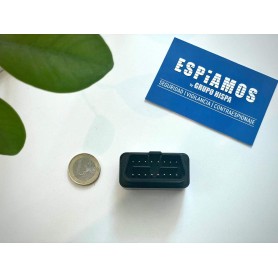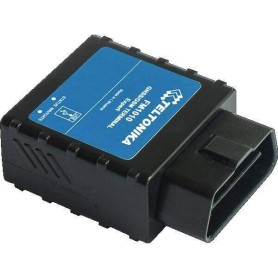3 products
OBD GPS Tracker: Smart Vehicle Tracking
OBD GPS trackers are devices designed to provide accurate, real-time vehicle tracking by connecting to an OBD-II port. This type of tracker is one of the simplest and most effective solutions for tracking cars, vans, and business fleets , as it requires no technical installation and can be activated in seconds.
Thanks to their compatibility with most modern vehicles, OBD GPS devices allow access to a wealth of real-time data, such as exact location, speed, fuel consumption, and engine diagnostics . This makes them an essential tool for those looking to optimize the safety and control of their vehicle.
These devices operate with a SIM card and connect to 4G, 3G, or GSM networks to send tracking information to a mobile app or tracking platform. Additionally, some advanced models include motion alerts, geofencing, and disconnection , making them ideal for theft protection and real-time vehicle management.
Why choose an OBD GPS Tracker?
OBD GPS trackers offer multiple advantages that make them one of the best options for vehicle tracking. Some of their most notable features include:
- Easy installation: They connect directly to the vehicle's OBD-II port without the need for tools or technical knowledge.
- Real-time tracking: Allows you to know the exact location of your vehicle at any time through a mobile app.
- Access to vehicle data: Provides information on speed, engine status, fuel consumption, and other important parameters.
- Smart Alerts: Notifications in case of disconnection, sudden acceleration, sudden braking, or entering or leaving safe zones.
- Universal Compatibility: Works on most cars and vans manufactured since 2000 with an OBD-II port.
Thanks to their advanced technology and ease of use, OBD GPS systems are an excellent choice for personal safety, fleet management, and vehicle maintenance optimization.
Types of OBD GPS Locators and Their Features
OBD GPS trackers differ based on their features and technology. When choosing a model, it's important to consider its functionality based on your intended use.
- Basic OBD GPS Trackers: Models designed exclusively for real-time vehicle tracking. They are ideal for individuals looking for a simple, installation-free solution.
- OBD GPS trackers with telemetry: In addition to tracking, they provide advanced data on engine status, fuel consumption, and fault diagnosis.
- OBD GPS trackers with advanced alerts: Devices that send notifications if anomalies are detected, such as sudden acceleration, sudden braking, or device disconnection.
- OBD GPS trackers with internal battery: Some models include a backup battery that allows the device to continue sending its location even if it is disconnected from the vehicle.
In addition to the device type, OBD GPS devices have a number of features that improve their performance and reliability:
- Real-time tracking: Precise information about the vehicle's location at any time.
- Route history: Record of journeys taken with the ability to review them from the app.
- Customizable Geofences: Alerts when the vehicle enters or leaves predefined zones.
- Compatibility with management platforms: Integration with specialized fleet management software.
- Tool-free installation: Connects in seconds to the OBD-II port without the need for vehicle modifications.
Where to Buy an OBD GPS Tracker?
If you're looking for a high-quality OBD GPS tracker , at ESPIAMOS® you'll find models designed to offer secure tracking and real-time data access . We offer cutting-edge devices for both individuals and businesses.
- Expert advice: We help you choose the most suitable model according to your needs.
- 3-year warranty: All our products come with an extended warranty.
- Fast and Discreet Shipping: We protect your privacy with every purchase.
- Secure payment: Different payment methods with complete confidence.
Buy your OBD GPS tracker at ESPIAMOS® and enjoy the latest technology in vehicle tracking without installation.
Frequently Asked Questions about OBD GPS Trackers
What are the benefits of using an OBD GPS tracker over other models?
The main benefit of an OBD GPS is its immediate installation. Simply plug it into the vehicle's OBD-II port to begin tracking. This solution avoids complicated installations and allows access to vehicle data such as speed, fuel consumption, and engine status. It is ideal for those who want a simple, practical tracking system with additional diagnostic functions without altering the original wiring. Furthermore, its portability allows it to be easily switched between compatible vehicles.
How do I know if my vehicle is compatible with an OBD GPS?
Most vehicles manufactured in Europe since 2000 already have an OBD-II port, which is essential for using these devices. This connector is usually located under the steering wheel, next to the fuse box, or in the center console. If you have questions about your car's compatibility, you can check the manufacturer's manual or contact the ESPIAMOS® technical team directly.
What happens if you disconnect the GPS tracker from the OBD port?
Many OBD GPS models include a disconnection alert that sends an immediate notification to the user as soon as the device is removed from the port. This feature adds an extra layer of security, allowing rapid action if someone tries to sabotage tracking. Some trackers also have an internal battery, allowing them to continue transmitting their location for a limited time after disconnection.
Can I check vehicle data in addition to its location?
Yes. OBD GPS models with telemetry capabilities allow you to access detailed vehicle information, such as engine diagnostics, fuel consumption, rpm, and temperature. This data is very useful for detecting mechanical faults, optimizing maintenance, or analyzing driving style. All of this can be conveniently accessed from a mobile app or online platform.
Are OBD trackers recommended for fleet management?
Absolutely. OBD GPS systems are an excellent option for companies looking to monitor their fleet without complex installations. Their ease of use, along with real-time tracking, route history, and smart alerts, make them highly effective tools for monitoring commercial vehicles. Furthermore, their compatibility with management software allows all information to be centralized from a single dashboard.






 WhatsApp
WhatsApp Telegram
Telegram






